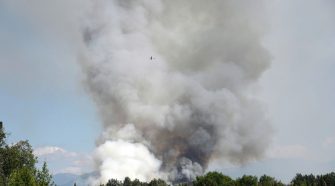Speaking Sunday, Xi said the “current epidemic situation is still severe and complex, and the prevention and control work is at the most critical stage.” The crisis is “the most difficult to prevent and control in China” since the founding of the People’s Republic in 1949, Xi said. He added the outbreak was likely to have a “great impact” on the country’s economy, but that epidemic prevention and control methods were beginning to have an effect.
Following Xi’s address, China announced it would delay the annual gathering of nearly 3,000 national legislators in Beijing, according to state media on Monday, underscoring the continuing impact and severity of the outbreak.
The National People’s Congress’s Standing Committed voted to delay the full session of the (NPC), the country’s rubber-stamp parliament, which had been scheduled to start on March 5. No new date has been announced.
As of Monday, there were at least 77,150 confirmed cases in mainland China, bringing the global total to
more than 79,000, with the death toll at 2,620.
A total of 27 of those deaths have occurred outside of mainland China, a major spike from a week ago, when only five deaths had taken place outside China, and most of those involving people who had a direct link to the country.
Major new outbreaks are also now developing in South Korea, Iran and Italy, with dozens of confirmed cases and multiple deaths.
South Korea’s Centers for Disease Control and Prevention announced on Monday that 70 additional coronavirus cases have been confirmed, bringing the country’s total to 833.
South Korean President Moon Jae-in said the country was at a “watershed moment” Sunday, as he issued the highest level of national alert and ordered new resources to tackling the outbreak, which is largely focused on the southern city of Daegu but has spread throughout the East Asian country, including among the military.
The Ministry of Defense of South Korea confirmed Monday that an additional four soldiers had been confirmed to have contracted the virus, bringing the total of military personnel to 11. There are fears that the outbreak could spread quickly among troops living in close confines, and potentially spread to US forces stationed in Korea.
‘Witch hunt’
Some 300 members of the group have tested positive for the virus, and more than 9,000 practitioners have been put into self-isolation while they are tested by health authorities. The infection is believed to have spread rapidly because of the mass worship sessions the group holds, which puts them in close contact with one another for long periods of time.
Kim So-il, a project director at Shincheonji, compared the recent criticism of the group to a “19th century witch-hunt.”
“It’s unfair that all people rebuke Shincheonji,” he told CNN, adding that the group was in “great difficulty” right now.”
Speaking Sunday, a Shincheonji representative told reporters that practitioners are the “biggest victims” of the virus, and urged people to “refrain from hate and groundless attack.”
According to the South Korean law on the prevention of infectious diseases, health authorities are able to seek help from police and telecommunication service providers are obliged to provide information when requested by the police.
The virus has spread beyond the Shincheonji members, however, with separate outbreaks in a hospital near Daegu, as well as among the country’s military. As of Monday, more than 760 cases had been confirmed nationwide, and seven deaths.
Italy locked down
Outside of Asia, there have been a spike in cases in Italy and Iran, renewing fears that the virus is spreading globally despite numerous travel restrictions placed on China.
Authorities in Italy announced sweeping closures across the country’s north and emergency measures Sunday as they scrambled to contain Europe’s largest outbreak. More than 130 cases have been confirmed in Italy so far, and three deaths.
“We still cannot identify patient zero, so it’s difficult to forecast possible new cases,” Angelo Borrelli, head of the country’s Civil Protection agency, said at a Sunday news conference.
Strict emergency measures were put in place over the weekend, including a ban on public events in 10 municipalities, after a spike in confirmed cases in the northern regions of Lombardy and Veneto.
Italy’s Health Minister Roberto Speranza announced severe restrictions in the affected regions, which included the closure of public buildings, limited transport, and the surveillance and quarantine of individuals who may have been exposed to the virus.
“We are asking basically that everyone who has come from areas stricken by the epidemic to remain under a mandatory house stay,” Speranza said at a Saturday press conference.
Italy’s top soccer league, Serie A, canceled at least three games scheduled to be played in Lombardy and Veneto regions.
The country’s fashion capital, Milan, announced it would close its schools starting Monday for a week. School trips inside and outside Italy were also being canceled from Sunday, according to a statement by Italy’s Ministry of Education.
Global concerns
Speaking Sunday, World Health Organization Director-General Tedros Adhanom Ghebreyesus said the “window of opportunity is narrowing” to contain the worst of the outbreak to mainland China.
“Although the total number of cases outside China remains relatively small, we are concerned about the number of cases with no clear epidemiological link, such as travel history to China or contact with a confirmed case,” he said.
The increase in cases in Iran, South Korea and Italy “is also a matter of concern and how the virus is now spreading to other parts of the world,” Tedros added.
Members of the G20, currently meeting in Saudi Arabia, warned that the coronavirus poses the greatest risk to the global economy.
“Global economic growth remains slow and downside risks to the outlook persist, including those arising from geopolitical and remaining trade tensions, and policy uncertainty. We will enhance global risk monitoring, including of the recent outbreak of Covid-19. We stand ready to take further action to address these risks,” according to the final document of the conference.
The host of the G20 meeting, Saudi Finance Minister Mohammed Al Jadaan, said that countries will be ready to act on the risk coronavirus poses to commerce.
“We all agreed that all countries and states will be ready to intervene as needed to face these risks and it’ll be a multilateral intervention including the WHO (World Health Organization) to monitor these risks and use relevant policies as needed,” Jadaan said.
CNN’s Steven Jiang, Lily Lee and Shanshan Wang contributed reporting from Beijing; Yoonjung Seo, Sophie Jeong and Jake Kwon contributed reporting from Seoul; Livia Borghese contributed reporting from Rome; Ben Tinker contributed reporting from Atlanta; Jessie Yeung, Carly Walsh and Helen Regan contributed reporting from Hong Kong.

















